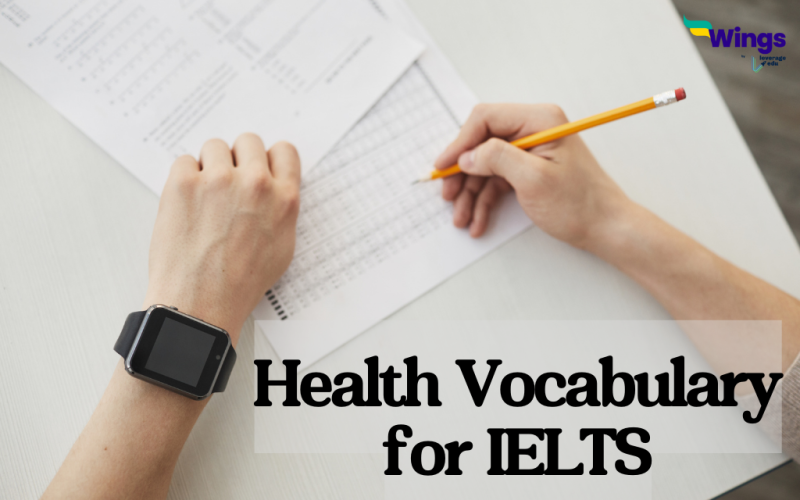Students who are travelling to English-speaking countries for studies or employment need to give IELTS exam as their English proficiency test. There are four sections in the IELTS exam i.e. Writing, Reading, Listening and Speaking. In all these sections, questions related to health and fitness are very common, so it is very important to have some good knowledge of the health vocabulary. In the IELTS exam, the ability to communicate in English in various situations is tested, including situations related to health. In this blog, we have mentioned all the details and tips you need to improve your health vocabulary.
This Blog Includes:
Importance of Health Vocabulary in IELTS
Having a strong vocabulary related to health is essential for achieving a high score on the IELTS exam. The importance of health vocabulary in the IELTS exam can be summarized in the following points:
Demonstrating language proficiency: The ability to communicate effectively in English is one of the main skills tested in the IELTS exam. Health-related vocabulary is a crucial component of this skill because it is used in many real-life situations, such as discussing medical issues with a doctor or nurse.
Understanding and responding to health-related questions: The IELTS exam includes questions related to health, such as questions about symptoms, treatments, and medical conditions. Having a strong vocabulary related to health can help test takers understand and respond to these questions effectively.
Writing about health-related topics: In the IELTS writing section, test takers are often asked to write essays on health-related topics such as public health, healthcare systems, and disease prevention. Using a variety of health-related vocabulary words can help test takers express their ideas more clearly and effectively.
Reading and understanding health-related texts: The IELTS exam includes reading passages related to health, such as articles about medical research, public health initiatives, and healthcare policies. Having a strong vocabulary related to health can help test takers understand these passages more easily and accurately.
Also Read: IELTS Vocabulary Writing Task 1: Check (Complete List)
Tips to Improve Health Vocabulary in IELTS
Improving one’s health vocabulary is essential for achieving a high score on the IELTS exam. Here are some tips to help test takers improve their health vocabulary:
Read health-related articles and publications: Reading articles and publications related to health can expose test takers to new vocabulary words and phrases. It is advisable to read articles from reputable sources such as medical journals, health magazines, and government health websites.
Watch health-related documentaries and TV shows: Watching documentaries and TV shows related to health can be an effective way to improve health vocabulary.
Use online health-related resources: Many online resources, such as medical dictionaries, health glossaries, and online health courses, can help test takers improve their health vocabulary.
Practice using healthy vocabulary in writing and speaking: Practicing using healthy vocabulary in writing and speaking can help test takers become more comfortable and fluent in using words and phrases.
Memorize health-related vocabulary: Test takers can create flashcards with health-related vocabulary words and definitions and review them regularly. This can help them retain the new vocabulary and improve their recall ability during the exam.
Also Read: IELTS Reading Vocabulary: Check (Complete List)
Examples of Health Vocabulary in IELTS
Here are some health-related vocabulary words and their meaning that can help you prepare for the health-related questions in the IELTS exam:
- Antibiotics: Medicines used to treat bacterial infections.
- Allergies: An abnormal reaction of the immune system to a substance that is usually harmless.
- Asthma: A respiratory condition characterized by difficulty breathing and wheezing.
- Blood pressure: The force exerted by the blood against the walls of the arteries.
- Cancer: A disease characterized by the uncontrolled growth and spread of abnormal cells.
- Diabetes: A condition in which the body is unable to properly regulate blood sugar levels.
- Epidemic: A sudden outbreak of a disease that affects a large number of people in a particular area or community.
- First aid: Emergency medical treatment given to an injured or sick person before professional medical care is available.
- Health insurance: A type of insurance that covers the cost of medical expenses.
- Immunization: The process of making a person immune to a disease by administering a vaccine.
- Infection: The invasion and multiplication of microorganisms in the body.
- Nutrition: The study of how food affects the body and how the body uses food.
- Pandemic: An outbreak of a disease that affects a large number of people across multiple countries or continents.
- Prescription: A written order from a doctor for a specific medication.
- Surgery: The branch of medicine that deals with the treatment of injuries, diseases, and deformities by manual or operative methods.
FAQs
It is important to have a broad range of health vocabulary related to topics such as medical conditions, symptoms, treatments, healthcare systems, public health, disease prevention, and medical research.
It is important to have a good understanding of general health-related topics such as medical conditions, symptoms, treatments, healthcare systems, public health, disease prevention, and medical research.
You can improve your health vocabulary by reading health-related articles and publications, watching health-related documentaries and TV shows, using online health-related resources, practising using the words in writing and speaking, and memorizing health-related vocabulary words and definitions.
We hope this article has provided you with all the information that you needed. All the best for your exam!
If you are planning to study abroad in the upcoming intakes get in touch with our study abroad experts at 1800-572-130.
 One app for all your study abroad needs
One app for all your study abroad needs
















 45,000+ students realised their study abroad dream with us. Take the first step today.
45,000+ students realised their study abroad dream with us. Take the first step today.